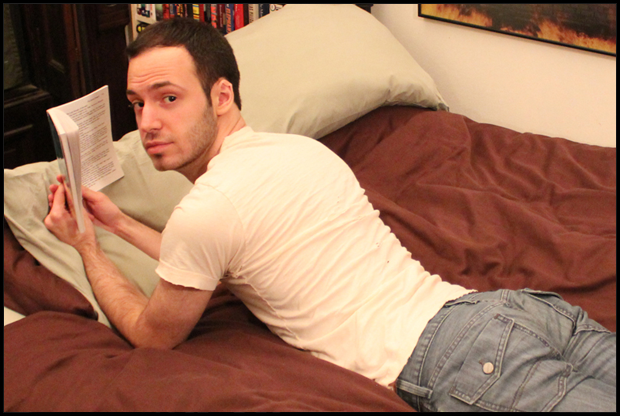
There are tons of books out there on the subject of film, acting, writing, whatever. I haven’t read most of them. I’ve read some, though. And these are my favorites. By ‘favorites’ I mean they’ve had a fucking seismic effect on me. Each one of these has helped expand my mind into what it is today. So, if you enjoy my work—whether it be my writings here at Smug Film, or my films—these books are partly responsible for why the things I say and do are so damn wonderful.
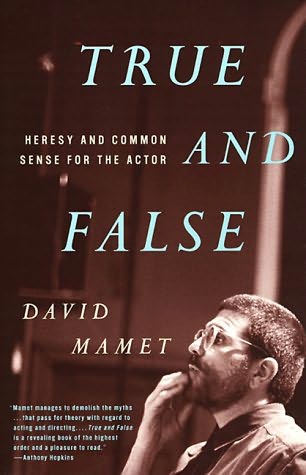
True and False: Heresy and Common Sense for the Actor | David Mamet
“You can pursue fame, but that doesn’t mean that you will achieve fame, or that if you get it you’ll find it is what you thought it was. Similarly, you can pursue money, or the phantom called mobility, which is to say ‘I just want to get far enough ahead so that I can do whatever I want.’ Well, you can attempt whatever you want today, and if you can’t today you aren’t going to be able to tomorrow.”
This is the first book I read of these six. I read it many, many years ago, probably in my late teens. My dad had found a copy of it on the street (in Brooklyn, sometimes people just straight up leave boxes of free books the street) and then it just sat in a pile in the house. I don’t think he ever read it. One day, I decided to give it a shot, since David Mamet was a name I’d heard of, and the book looked short. I instantly fell in love with it, and him, and subsequently devoured all his other books and works.
To oversimplify the book, basically his philosophy is that of ‘less is more’. He believes that most acting theory is bullshit, and that acting isn’t actually all that difficult or complicated—yet actors make it so. They get too into their own head and start trying to add to much to their rehearsals and performances, when really they’d do a much a better job if they said the line simply, without putting much else behind it, and put trust in the power of the words. I’ve experienced the self-doubt of actors first hand, rehearsing my co-stars in Shredder, and Mamet is absolutely right. Once you can get them to let go of all the weird shit they put into their heads, their performances start to come off very natural.
What could have easily been a very didactic and crotchety book is actually quite zen and liberating. His approach and his wisdom are helpful no matter what you do in life, as you can see by the quote I chose. He’s a great coach, and really makes you excited to get back on the field and do a good job. Definitely check this one out, whether you’re an actor or not.
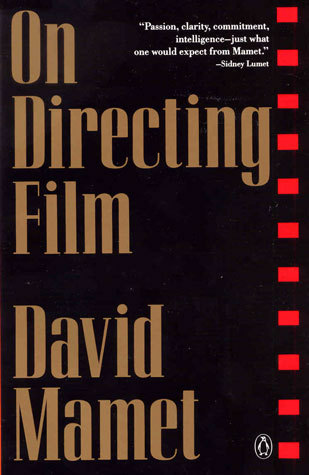
On Directing Film | David Mamet
“A good writer gets better only be learning to cut, to remove the ornamental, the descriptive, the narrative, and especially the deeply felt and meaningful. What remains? The story remains. What is the story? The story is the essential progression of incidents that occur to the hero in pursuit of his one goal.”
This book could more accurately be titled ‘On Writing, Directing, and Editing Film’ because, as you can see by the quote, it’s equally helpful when it comes to all those tasks. Between this and True and False, you will understand basically every facet of Mamet’s approach to doing a thing. His other books are great too, and you should definitely read them as well, but these two definitely go hand in hand. You can’t read one without the other.
What helped me the most from this book are the passages on visual storytelling, in which he discusses how to make sure every single scene, hell, every single cut serves the story. This is a very difficult thing to do when writing a script, mostly because, in my opinion, most movies mishandle it. How many times have we seen opening sequences that are supposed to set up our protagonist, but are actually redundant, or even superfluous? And so, when you sits down to write your first 15 pages, you’ve got all those bad examples swimming around in your head, and its hard not to write something shitty. After you read this book, every time you put something to paper that probably doesn’t need to be there, you’ll have Mamet on your shoulder nagging you to ‘justify it’—and you’ll wonder how you ever got along without him.
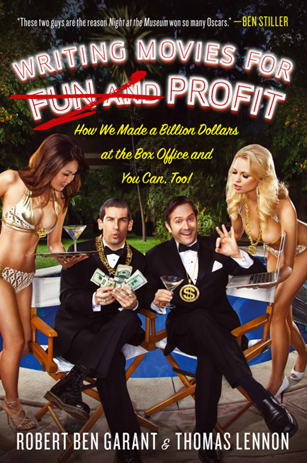
Writing Movies for Fun and Profit | Thomas Lennon & Robert Ben Garant
“There are many lecture circuit bullshit artists who say that to write a good screenplay, the most important thing is to come up with ‘a story that needs to be told.’ They use that phrase over and over: Is yours ‘a story that needs to be told’?
Here’s a little homework for you. Go see what movies are playing in your local theaters right now. We’ll wait.
Okay, now—can you honestly say any of those movies playing has a story that ‘NEEDED to be told’? Really? Was Transformers 2: Revenge of the Fallen ‘a story that needed to be told’?
Even with the great movies? The Matrix. Casablanca. Terminator. The Pacifier. Are those stories that ‘needed to be told’? A documentary about a guy wrongfully accused of murder, and the guy is still on death row right now—sure. That story ‘needs to be told.’
Studio movies need to be one thing: ENTERTAINING.”
This is a very funny and informative book about the very specific discipline of writing a Hollywood screenplay, which is a very different beast than writing a little self-financed indie film or whatever. But even if you never want to write Hollywood scripts, you should absolutely read this, because it’s important to accurately understand the craziness of the institution you’re rebelling against—and boy do they let cats out of the bag in that regard.
They also provide you with some of the best movie outline examples I’ve ever seen. Outlining is an extraordinarily important task when it comes to writing a movie. It saves you time and energy by helping you avoid tons of script problems you would’ve run into later on. So follow their sage advice. And, since they’re professionally funny people, it’s much more fun than reading Syd Field or whatever.
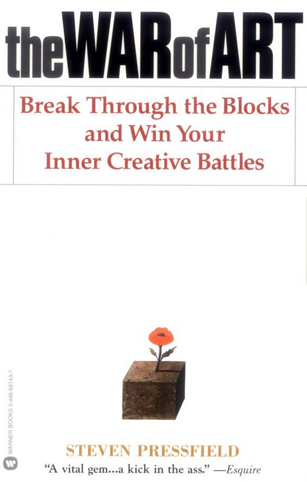
The War of Art | Steven Pressfield
“There’s a secret that real writers know that wannabe writers don’t, and the secret is this: It’s not the writing part that’s hard. What’s hard is sitting down to write. What keeps us from sitting down is Resistance.”
This book is for anyone who makes any sort of art, or anyone curious about what the ‘artistic process’ that artists always speak of actually entails. Pressfield gets to the bottom of what exactly makes writing so damn hard sometimes. The ‘resistance’ he speaks of is, basically, self-generated bullshit—fear, doubt, procrastination, rationalization, etc. Pretty much all the shit that suddenly appears in our head whenever we undertake a new project, whether it be writing the next great movie or a daily abdominal routine.
It’s a very breezy, short read, but it’s one you’ll return to time and time again whenever you need a swift kick in the pants.
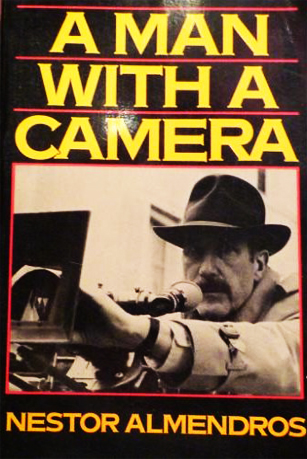
A Man With a Camera | Nestor Almendros
“When it comes to lighting, one of my basic principles is that the light sources must be justified. I believe that what is functional is beautiful, that functional light is beautiful light. I try to make sure that my light is logical rather than aesthetic. In a natural set I use what light there is, reinforcing it when necessary. In a studio set I imagine that the sun is shining from a certain point outside, and I decided how the light would come through the windows. The rest is easy.
From the days of my first feature film, La Collectionneuse, I realized that most technicians lie or exaggerate. They arrange things so that they use huge quantities of light (which means electricity). Even when it is unnecessary, they love to make themselves more important, to justify their salaries, whereas there is really little technique to know.”
This book is out of print, pretty hard to find, and highly sought after. Well-worn copies regularly go on Amazon marketplace for $90 minimum, so you probably won’t be buying this one. But I have to mention it here because it’s just that wonderful.
You might not know Almendros by name, but chances are, you’ve seen something he’s had a hand in. He’s a cinematographer who was worked with greats such as Terrence Malick, Francois Truffaut, and Eric Rohmer. He has a very distinct, minimalist approach, in which he utilizes natural and available light as much as possible. Famously, the lighting guys on Days of Heaven hated him, because when he’d show up on set, he was always asking them to take down lights.
I’ve always felt that less is more when it comes to lighting. I shot Shredder and Rehearsals solely with natural and available light. I find that the result is always a much realer experience for the viewer, and, if you do it right, a much more beautiful experience. So reading this book, after I’d already made both those films, was a huge ‘thank god I’m not alone’ experience for me. His approach is very similar to my own—particularly in regards to building scenes around existing light sources, rather than bringing in all sorts of alien light sources to stubbornly make a particular area of a room ‘work’. This is such a simple approach that unfortunately not enough budding filmmakers attempt, particular ones that are a part of the ‘DSLR revolution’. And it’s sad to me that these people with such great low-light digital cameras spend so much money renting expensive lights, obsessing over three-point lighting, and generally just trying to do things the ‘professional way’. The result is always something that looks unnatural and fake.
If you want to make films, spring for this book. $90 may seem like a lot, but it’s way cheaper than a goddamn Kino Flo.
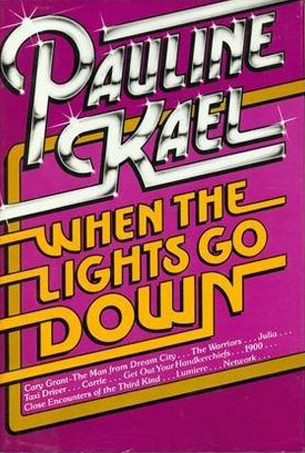
When the Lights Go Down | Pauline Kael
“Carrie is a terrifyingly lyrical thriller. The director, Brian De Palma, has mastered a teasing style—a perverse mixture of comedy and horror and tension, like that of Hitchcock and Polanski, but with a lulling sensuousness. He builds or apprehensions languorously, softening us for the kill. You know you’re being manipulated, but he works in such a literal way and with so much candor that you have the pleasure of observing how he affects your susceptibilities even while you’re going into shock. Scary-and-funny must be the greatest combination for popular entertainment; anything-and-funny is, of course, great—even funny-and-funny. But we come out of a movie like Carrie, as we did out of Jaws, laughing at our own childishness. It’s like watching our team win a ballgame—we’re almost embarrassed at how bracing it is.”
Pauline Kael is my favorite film critic. In fact, before reading her stuff, I never really cared much for film criticism, because my only exposure to it were hacks who give things ‘apples’ or whatever. But Kael is a goddamn artist. She has an eye as keen, if not keener, that most filmmakers. And even if you don’t agree with her particular opinions about a film, they’re always fun to read, and impossible not to respect.
This book contains all her reviews from the late 70‘s, including classics such as Rocky, Star Wars, The Warriors, Superman, Saturday Night Fever, and Carrie. They’re all great, but her review of Carrie is my favorite review I’ve ever read. She perfectly explains everything that is wonderful about the movie, and even pinpoints its very slim flaws. It’s a masterful assessment. And if it weren’t for Pauline Kael, Smug Film probably wouldn’t exist, so if you dig what we do, definitely check her out.
In Conclusion
Buy these things. They’re good things. And do leave your personal recommendations in the comments!
Pretty good little list – I’m not a big advocate of screenwriting books for the most part. I think understanding story structure and what works is crucial but it seems that most authors who discuss screenwriting are simply recycling the same old stuff over and over again (three-act structure, hero’s journey, etc.) and sell their books as one complete, authoritative package – how to write your movie, pitch your movie, sell your movie when all three are very different skills (or disciplines). No one screenwriter, regardless of how successful they were, could possibly be the sole voice of authority on doing all three perfectly – if they could they probably wouldn’t write the book. However, I have to say I’d recommend MAKING A GOOD SCRIPT GREAT by Linda Seger – as it focuses purely on fine tuning your script before sending it off, rather than building a cliched script from the ground up. Reading it also lets you spot out story weaknesses a mile away. Another choice whose exclusion from this list baffles me is SHOOTING TO KILL, by Christine Vachon, who writes from her own experience producing 40+ independent films – offering sample budget breakdowns, film proposals, and very in-depth production diaries of her tension-filled days on movie sets – it really gets you to think about all the trivial details as a filmmaker – location scouting, casting, pitching to investors and even distribution and playing the festival circuit.
James,
I own Shooting to Kill, but haven’t read it yet. I shall move it higher up in my mental queue! Thanks for the rec.
I’ve read Making a Good Script Great (small world—my dad designed the cover for it) but I wasn’t terribly keen on it. She kinda lost me when she went on and on about the movie Witness. But you’re right, her tips for tweaking a script are certainly helpful.
Yeah, as good a movie as WITNESS is, it seems to be the favorite of all the screenwriting gurus to talk about as “the perfect screenplay.” While I believe there are plenty of excellent screenplays and WITNESS probably being among them, I feel that calling one screenplay perfect means that it’s a model which every other screenplay has to aspire to – and it’s tough to do that if you’re trying to write a romantic comedy or a sword and sandal epic, let alone a non-linear film or other art movie. I feel every project has to be judged by its own merits alone and how effective they are in being entertaining or emotionally moving.